Litigation, ADR, Trade Unions, and Tribunals: A Comprehensive Analysis
VerifiedAdded on 2022/08/17
|7
|2217
|14
Report
AI Summary
This report provides an overview of litigation, alternative dispute resolution (ADR) methods, trade unions, and tribunals. It defines litigation as the process of resolving disputes in court, highlighting its advantages and disadvantages, and then explores ADR methods such as negotiation, mediation, conciliation, ombudsman services, and arbitration, emphasizing their benefits like cost-effectiveness and speed. The report then delves into trade unions, their roles in collective bargaining, and the rights of employees. Finally, it examines tribunals, their functions, advantages, and criticisms, along with examples of tribunals in the UK and Sri Lanka. The report offers a comprehensive understanding of legal processes and dispute resolution mechanisms, essential for students of law and related fields. Desklib offers a platform for students to access and learn from similar assignments and past papers.
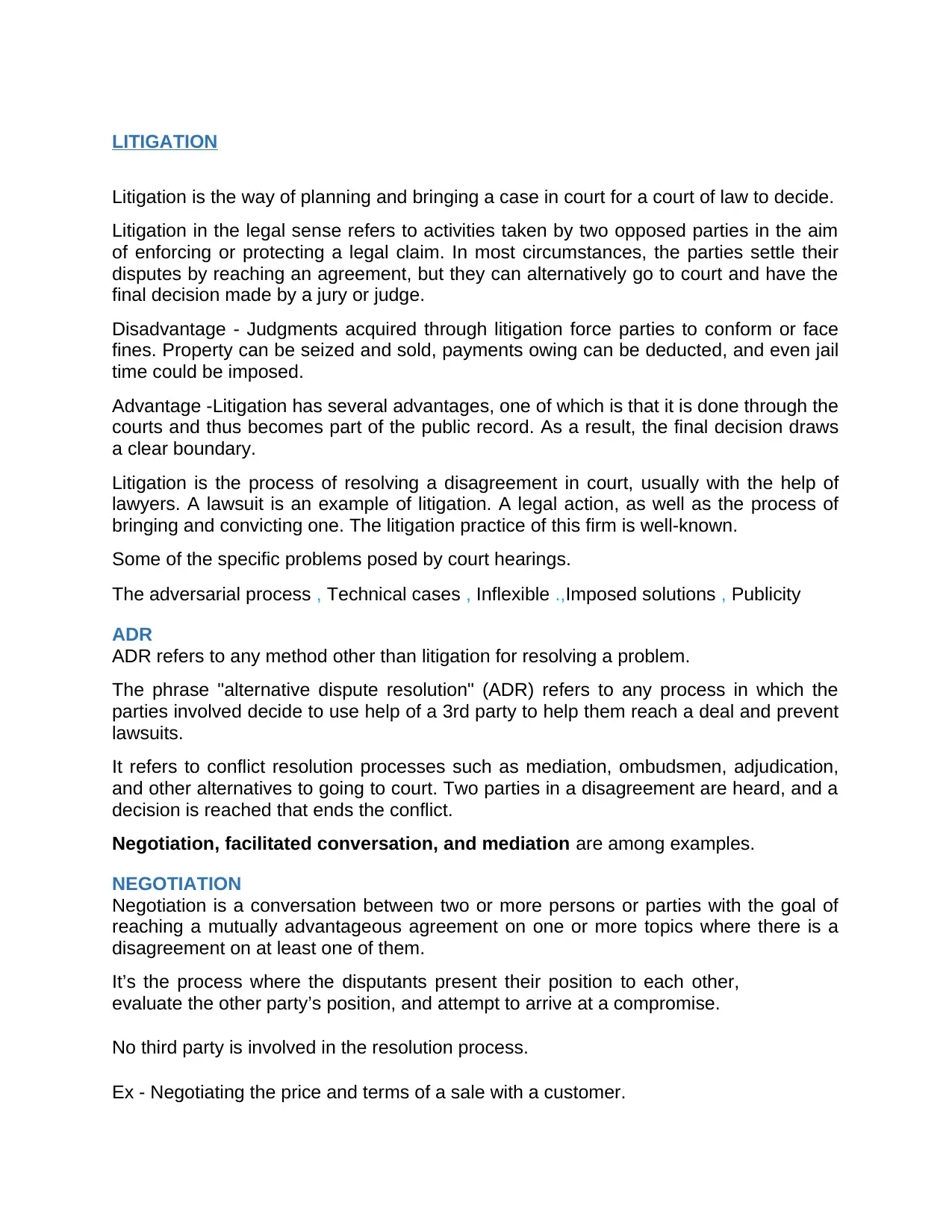
LITIGATION
Litigation is the way of planning and bringing a case in court for a court of law to decide.
Litigation in the legal sense refers to activities taken by two opposed parties in the aim
of enforcing or protecting a legal claim. In most circumstances, the parties settle their
disputes by reaching an agreement, but they can alternatively go to court and have the
final decision made by a jury or judge.
Disadvantage - Judgments acquired through litigation force parties to conform or face
fines. Property can be seized and sold, payments owing can be deducted, and even jail
time could be imposed.
Advantage -Litigation has several advantages, one of which is that it is done through the
courts and thus becomes part of the public record. As a result, the final decision draws
a clear boundary.
Litigation is the process of resolving a disagreement in court, usually with the help of
lawyers. A lawsuit is an example of litigation. A legal action, as well as the process of
bringing and convicting one. The litigation practice of this firm is well-known.
Some of the specific problems posed by court hearings.
The adversarial process , Technical cases , Inflexible .,Imposed solutions , Publicity
ADR
ADR refers to any method other than litigation for resolving a problem.
The phrase "alternative dispute resolution" (ADR) refers to any process in which the
parties involved decide to use help of a 3rd party to help them reach a deal and prevent
lawsuits.
It refers to conflict resolution processes such as mediation, ombudsmen, adjudication,
and other alternatives to going to court. Two parties in a disagreement are heard, and a
decision is reached that ends the conflict.
Negotiation, facilitated conversation, and mediation are among examples.
NEGOTIATION
Negotiation is a conversation between two or more persons or parties with the goal of
reaching a mutually advantageous agreement on one or more topics where there is a
disagreement on at least one of them.
It’s the process where the disputants present their position to each other,
evaluate the other party’s position, and attempt to arrive at a compromise.
No third party is involved in the resolution process.
Ex - Negotiating the price and terms of a sale with a customer.
Litigation is the way of planning and bringing a case in court for a court of law to decide.
Litigation in the legal sense refers to activities taken by two opposed parties in the aim
of enforcing or protecting a legal claim. In most circumstances, the parties settle their
disputes by reaching an agreement, but they can alternatively go to court and have the
final decision made by a jury or judge.
Disadvantage - Judgments acquired through litigation force parties to conform or face
fines. Property can be seized and sold, payments owing can be deducted, and even jail
time could be imposed.
Advantage -Litigation has several advantages, one of which is that it is done through the
courts and thus becomes part of the public record. As a result, the final decision draws
a clear boundary.
Litigation is the process of resolving a disagreement in court, usually with the help of
lawyers. A lawsuit is an example of litigation. A legal action, as well as the process of
bringing and convicting one. The litigation practice of this firm is well-known.
Some of the specific problems posed by court hearings.
The adversarial process , Technical cases , Inflexible .,Imposed solutions , Publicity
ADR
ADR refers to any method other than litigation for resolving a problem.
The phrase "alternative dispute resolution" (ADR) refers to any process in which the
parties involved decide to use help of a 3rd party to help them reach a deal and prevent
lawsuits.
It refers to conflict resolution processes such as mediation, ombudsmen, adjudication,
and other alternatives to going to court. Two parties in a disagreement are heard, and a
decision is reached that ends the conflict.
Negotiation, facilitated conversation, and mediation are among examples.
NEGOTIATION
Negotiation is a conversation between two or more persons or parties with the goal of
reaching a mutually advantageous agreement on one or more topics where there is a
disagreement on at least one of them.
It’s the process where the disputants present their position to each other,
evaluate the other party’s position, and attempt to arrive at a compromise.
No third party is involved in the resolution process.
Ex - Negotiating the price and terms of a sale with a customer.
Paraphrase This Document
Need a fresh take? Get an instant paraphrase of this document with our AI Paraphraser
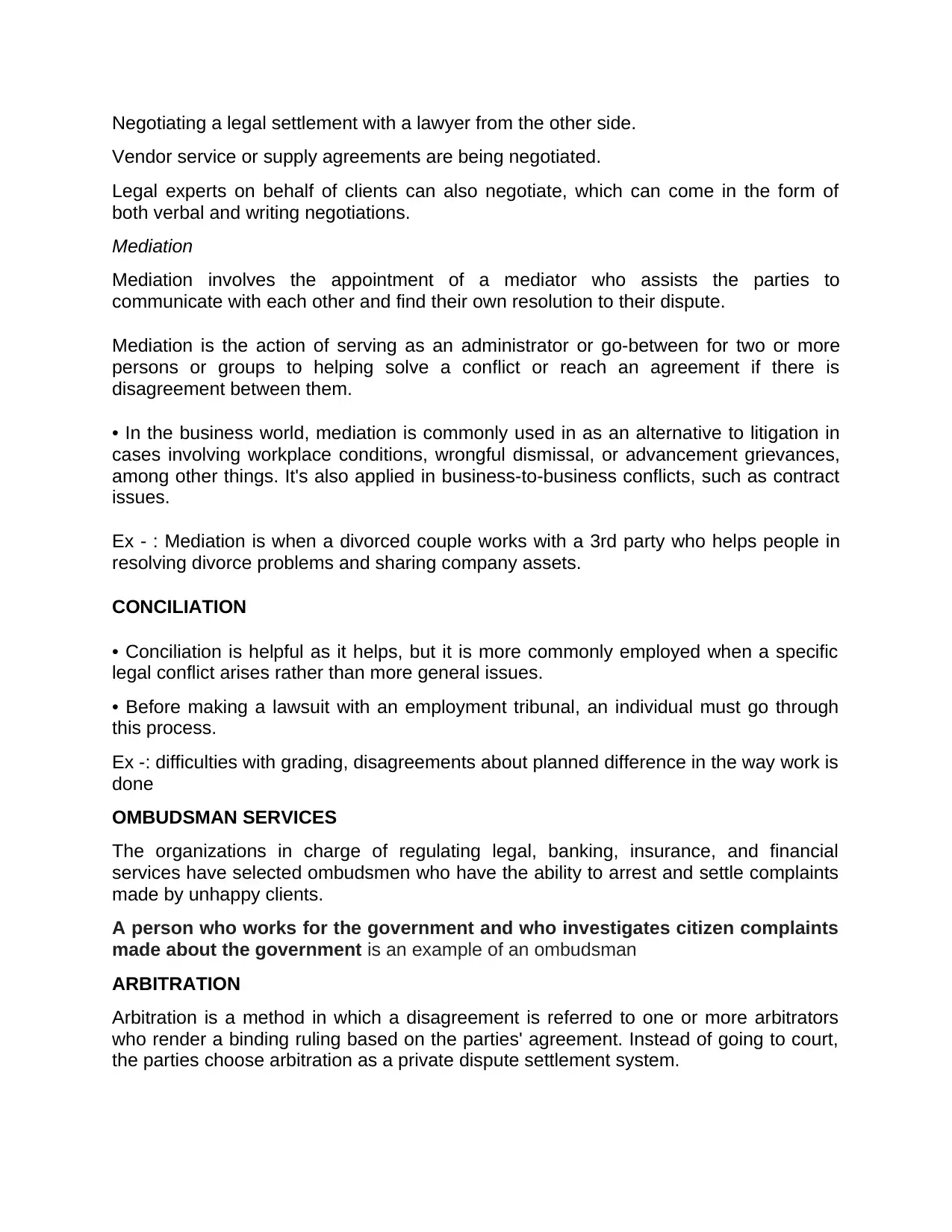
Negotiating a legal settlement with a lawyer from the other side.
Vendor service or supply agreements are being negotiated.
Legal experts on behalf of clients can also negotiate, which can come in the form of
both verbal and writing negotiations.
Mediation
Mediation involves the appointment of a mediator who assists the parties to
communicate with each other and find their own resolution to their dispute.
Mediation is the action of serving as an administrator or go-between for two or more
persons or groups to helping solve a conflict or reach an agreement if there is
disagreement between them.
• In the business world, mediation is commonly used in as an alternative to litigation in
cases involving workplace conditions, wrongful dismissal, or advancement grievances,
among other things. It's also applied in business-to-business conflicts, such as contract
issues.
Ex - : Mediation is when a divorced couple works with a 3rd party who helps people in
resolving divorce problems and sharing company assets.
CONCILIATION
• Conciliation is helpful as it helps, but it is more commonly employed when a specific
legal conflict arises rather than more general issues.
• Before making a lawsuit with an employment tribunal, an individual must go through
this process.
Ex -: difficulties with grading, disagreements about planned difference in the way work is
done
OMBUDSMAN SERVICES
The organizations in charge of regulating legal, banking, insurance, and financial
services have selected ombudsmen who have the ability to arrest and settle complaints
made by unhappy clients.
A person who works for the government and who investigates citizen complaints
made about the government is an example of an ombudsman
ARBITRATION
Arbitration is a method in which a disagreement is referred to one or more arbitrators
who render a binding ruling based on the parties' agreement. Instead of going to court,
the parties choose arbitration as a private dispute settlement system.
Vendor service or supply agreements are being negotiated.
Legal experts on behalf of clients can also negotiate, which can come in the form of
both verbal and writing negotiations.
Mediation
Mediation involves the appointment of a mediator who assists the parties to
communicate with each other and find their own resolution to their dispute.
Mediation is the action of serving as an administrator or go-between for two or more
persons or groups to helping solve a conflict or reach an agreement if there is
disagreement between them.
• In the business world, mediation is commonly used in as an alternative to litigation in
cases involving workplace conditions, wrongful dismissal, or advancement grievances,
among other things. It's also applied in business-to-business conflicts, such as contract
issues.
Ex - : Mediation is when a divorced couple works with a 3rd party who helps people in
resolving divorce problems and sharing company assets.
CONCILIATION
• Conciliation is helpful as it helps, but it is more commonly employed when a specific
legal conflict arises rather than more general issues.
• Before making a lawsuit with an employment tribunal, an individual must go through
this process.
Ex -: difficulties with grading, disagreements about planned difference in the way work is
done
OMBUDSMAN SERVICES
The organizations in charge of regulating legal, banking, insurance, and financial
services have selected ombudsmen who have the ability to arrest and settle complaints
made by unhappy clients.
A person who works for the government and who investigates citizen complaints
made about the government is an example of an ombudsman
ARBITRATION
Arbitration is a method in which a disagreement is referred to one or more arbitrators
who render a binding ruling based on the parties' agreement. Instead of going to court,
the parties choose arbitration as a private dispute settlement system.
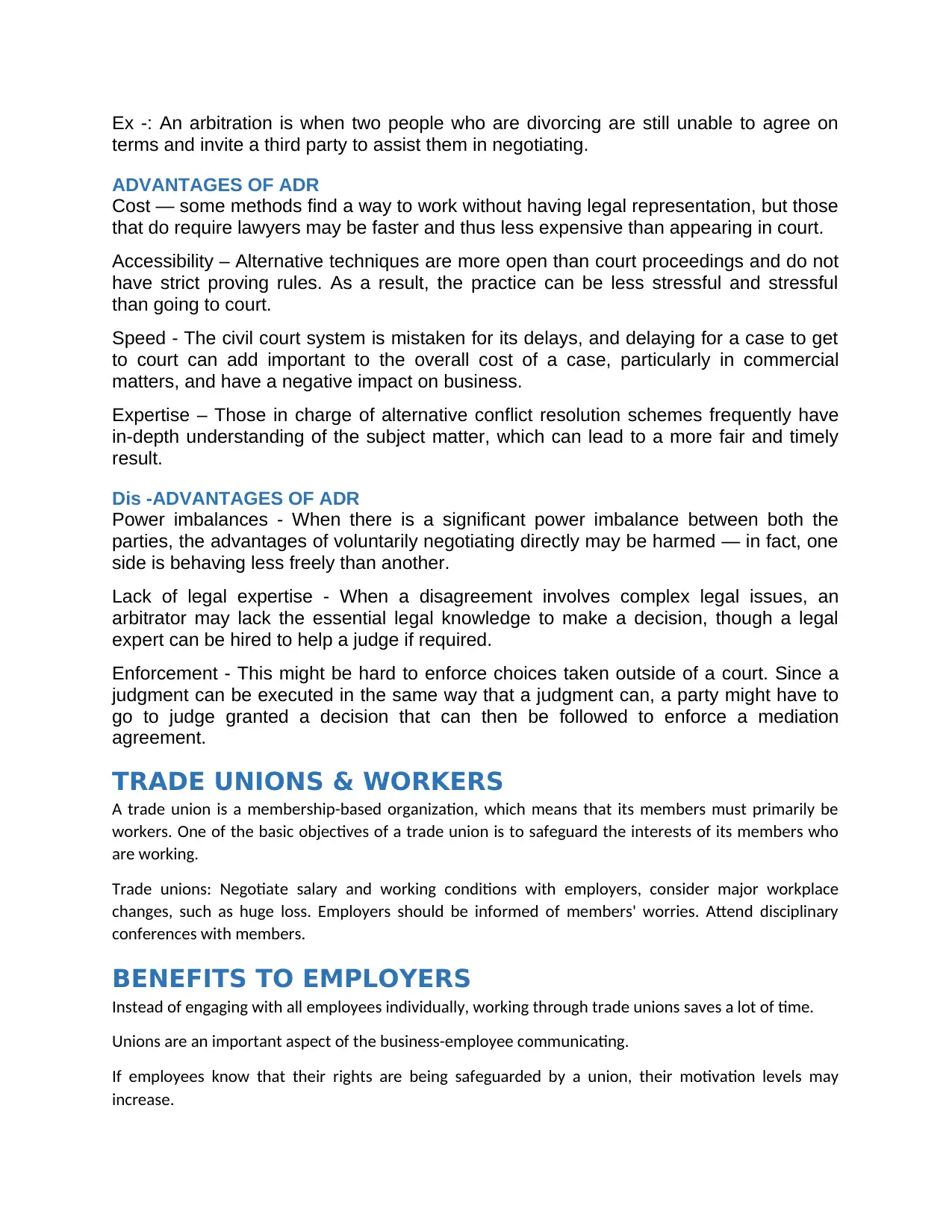
Ex -: An arbitration is when two people who are divorcing are still unable to agree on
terms and invite a third party to assist them in negotiating.
ADVANTAGES OF ADR
Cost — some methods find a way to work without having legal representation, but those
that do require lawyers may be faster and thus less expensive than appearing in court.
Accessibility – Alternative techniques are more open than court proceedings and do not
have strict proving rules. As a result, the practice can be less stressful and stressful
than going to court.
Speed - The civil court system is mistaken for its delays, and delaying for a case to get
to court can add important to the overall cost of a case, particularly in commercial
matters, and have a negative impact on business.
Expertise – Those in charge of alternative conflict resolution schemes frequently have
in-depth understanding of the subject matter, which can lead to a more fair and timely
result.
Dis -ADVANTAGES OF ADR
Power imbalances - When there is a significant power imbalance between both the
parties, the advantages of voluntarily negotiating directly may be harmed — in fact, one
side is behaving less freely than another.
Lack of legal expertise - When a disagreement involves complex legal issues, an
arbitrator may lack the essential legal knowledge to make a decision, though a legal
expert can be hired to help a judge if required.
Enforcement - This might be hard to enforce choices taken outside of a court. Since a
judgment can be executed in the same way that a judgment can, a party might have to
go to judge granted a decision that can then be followed to enforce a mediation
agreement.
TRADE UNIONS & WORKERS
A trade union is a membership-based organization, which means that its members must primarily be
workers. One of the basic objectives of a trade union is to safeguard the interests of its members who
are working.
Trade unions: Negotiate salary and working conditions with employers, consider major workplace
changes, such as huge loss. Employers should be informed of members' worries. Attend disciplinary
conferences with members.
BENEFITS TO EMPLOYERS
Instead of engaging with all employees individually, working through trade unions saves a lot of time.
Unions are an important aspect of the business-employee communicating.
If employees know that their rights are being safeguarded by a union, their motivation levels may
increase.
terms and invite a third party to assist them in negotiating.
ADVANTAGES OF ADR
Cost — some methods find a way to work without having legal representation, but those
that do require lawyers may be faster and thus less expensive than appearing in court.
Accessibility – Alternative techniques are more open than court proceedings and do not
have strict proving rules. As a result, the practice can be less stressful and stressful
than going to court.
Speed - The civil court system is mistaken for its delays, and delaying for a case to get
to court can add important to the overall cost of a case, particularly in commercial
matters, and have a negative impact on business.
Expertise – Those in charge of alternative conflict resolution schemes frequently have
in-depth understanding of the subject matter, which can lead to a more fair and timely
result.
Dis -ADVANTAGES OF ADR
Power imbalances - When there is a significant power imbalance between both the
parties, the advantages of voluntarily negotiating directly may be harmed — in fact, one
side is behaving less freely than another.
Lack of legal expertise - When a disagreement involves complex legal issues, an
arbitrator may lack the essential legal knowledge to make a decision, though a legal
expert can be hired to help a judge if required.
Enforcement - This might be hard to enforce choices taken outside of a court. Since a
judgment can be executed in the same way that a judgment can, a party might have to
go to judge granted a decision that can then be followed to enforce a mediation
agreement.
TRADE UNIONS & WORKERS
A trade union is a membership-based organization, which means that its members must primarily be
workers. One of the basic objectives of a trade union is to safeguard the interests of its members who
are working.
Trade unions: Negotiate salary and working conditions with employers, consider major workplace
changes, such as huge loss. Employers should be informed of members' worries. Attend disciplinary
conferences with members.
BENEFITS TO EMPLOYERS
Instead of engaging with all employees individually, working through trade unions saves a lot of time.
Unions are an important aspect of the business-employee communicating.
If employees know that their rights are being safeguarded by a union, their motivation levels may
increase.
⊘ This is a preview!⊘
Do you want full access?
Subscribe today to unlock all pages.

Trusted by 1+ million students worldwide
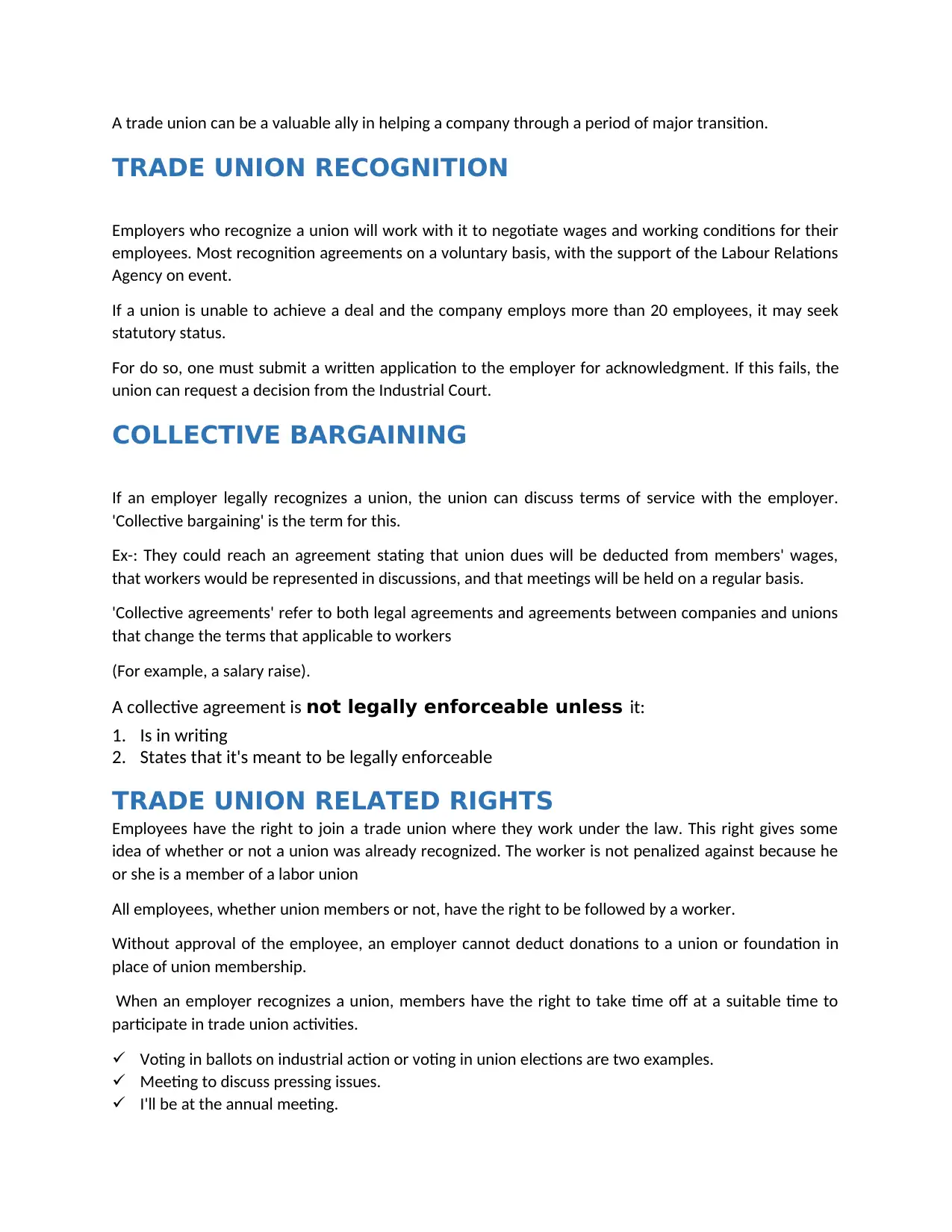
A trade union can be a valuable ally in helping a company through a period of major transition.
TRADE UNION RECOGNITION
Employers who recognize a union will work with it to negotiate wages and working conditions for their
employees. Most recognition agreements on a voluntary basis, with the support of the Labour Relations
Agency on event.
If a union is unable to achieve a deal and the company employs more than 20 employees, it may seek
statutory status.
For do so, one must submit a written application to the employer for acknowledgment. If this fails, the
union can request a decision from the Industrial Court.
COLLECTIVE BARGAINING
If an employer legally recognizes a union, the union can discuss terms of service with the employer.
'Collective bargaining' is the term for this.
Ex-: They could reach an agreement stating that union dues will be deducted from members' wages,
that workers would be represented in discussions, and that meetings will be held on a regular basis.
'Collective agreements' refer to both legal agreements and agreements between companies and unions
that change the terms that applicable to workers
(For example, a salary raise).
A collective agreement is not legally enforceable unless it:
1. Is in writing
2. States that it's meant to be legally enforceable
TRADE UNION RELATED RIGHTS
Employees have the right to join a trade union where they work under the law. This right gives some
idea of whether or not a union was already recognized. The worker is not penalized against because he
or she is a member of a labor union
All employees, whether union members or not, have the right to be followed by a worker.
Without approval of the employee, an employer cannot deduct donations to a union or foundation in
place of union membership.
When an employer recognizes a union, members have the right to take time off at a suitable time to
participate in trade union activities.
Voting in ballots on industrial action or voting in union elections are two examples.
Meeting to discuss pressing issues.
I'll be at the annual meeting.
TRADE UNION RECOGNITION
Employers who recognize a union will work with it to negotiate wages and working conditions for their
employees. Most recognition agreements on a voluntary basis, with the support of the Labour Relations
Agency on event.
If a union is unable to achieve a deal and the company employs more than 20 employees, it may seek
statutory status.
For do so, one must submit a written application to the employer for acknowledgment. If this fails, the
union can request a decision from the Industrial Court.
COLLECTIVE BARGAINING
If an employer legally recognizes a union, the union can discuss terms of service with the employer.
'Collective bargaining' is the term for this.
Ex-: They could reach an agreement stating that union dues will be deducted from members' wages,
that workers would be represented in discussions, and that meetings will be held on a regular basis.
'Collective agreements' refer to both legal agreements and agreements between companies and unions
that change the terms that applicable to workers
(For example, a salary raise).
A collective agreement is not legally enforceable unless it:
1. Is in writing
2. States that it's meant to be legally enforceable
TRADE UNION RELATED RIGHTS
Employees have the right to join a trade union where they work under the law. This right gives some
idea of whether or not a union was already recognized. The worker is not penalized against because he
or she is a member of a labor union
All employees, whether union members or not, have the right to be followed by a worker.
Without approval of the employee, an employer cannot deduct donations to a union or foundation in
place of union membership.
When an employer recognizes a union, members have the right to take time off at a suitable time to
participate in trade union activities.
Voting in ballots on industrial action or voting in union elections are two examples.
Meeting to discuss pressing issues.
I'll be at the annual meeting.
Paraphrase This Document
Need a fresh take? Get an instant paraphrase of this document with our AI Paraphraser
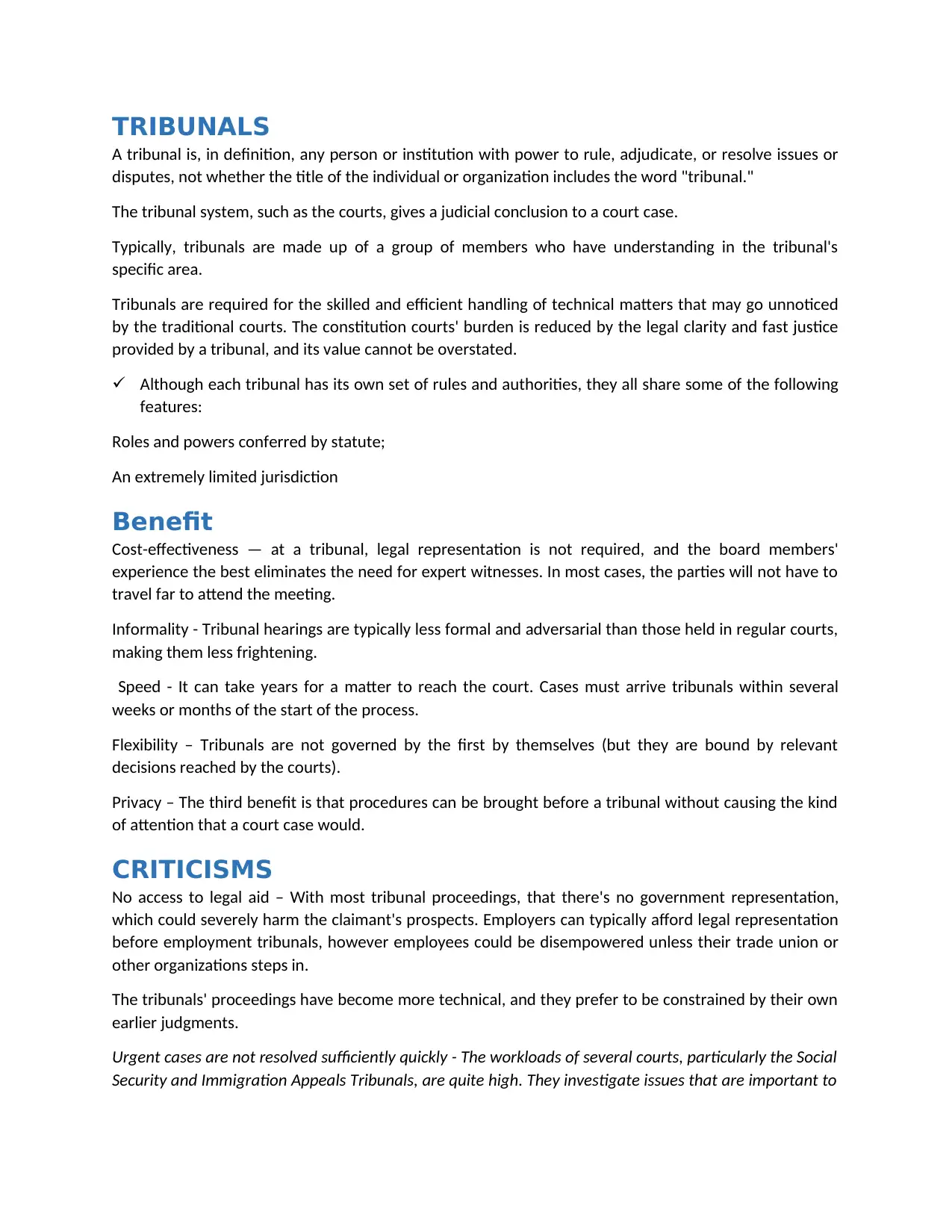
TRIBUNALS
A tribunal is, in definition, any person or institution with power to rule, adjudicate, or resolve issues or
disputes, not whether the title of the individual or organization includes the word "tribunal."
The tribunal system, such as the courts, gives a judicial conclusion to a court case.
Typically, tribunals are made up of a group of members who have understanding in the tribunal's
specific area.
Tribunals are required for the skilled and efficient handling of technical matters that may go unnoticed
by the traditional courts. The constitution courts' burden is reduced by the legal clarity and fast justice
provided by a tribunal, and its value cannot be overstated.
Although each tribunal has its own set of rules and authorities, they all share some of the following
features:
Roles and powers conferred by statute;
An extremely limited jurisdiction
Benefit
Cost-effectiveness — at a tribunal, legal representation is not required, and the board members'
experience the best eliminates the need for expert witnesses. In most cases, the parties will not have to
travel far to attend the meeting.
Informality - Tribunal hearings are typically less formal and adversarial than those held in regular courts,
making them less frightening.
Speed - It can take years for a matter to reach the court. Cases must arrive tribunals within several
weeks or months of the start of the process.
Flexibility – Tribunals are not governed by the first by themselves (but they are bound by relevant
decisions reached by the courts).
Privacy – The third benefit is that procedures can be brought before a tribunal without causing the kind
of attention that a court case would.
CRITICISMS
No access to legal aid – With most tribunal proceedings, that there's no government representation,
which could severely harm the claimant's prospects. Employers can typically afford legal representation
before employment tribunals, however employees could be disempowered unless their trade union or
other organizations steps in.
The tribunals' proceedings have become more technical, and they prefer to be constrained by their own
earlier judgments.
Urgent cases are not resolved sufficiently quickly - The workloads of several courts, particularly the Social
Security and Immigration Appeals Tribunals, are quite high. They investigate issues that are important to
A tribunal is, in definition, any person or institution with power to rule, adjudicate, or resolve issues or
disputes, not whether the title of the individual or organization includes the word "tribunal."
The tribunal system, such as the courts, gives a judicial conclusion to a court case.
Typically, tribunals are made up of a group of members who have understanding in the tribunal's
specific area.
Tribunals are required for the skilled and efficient handling of technical matters that may go unnoticed
by the traditional courts. The constitution courts' burden is reduced by the legal clarity and fast justice
provided by a tribunal, and its value cannot be overstated.
Although each tribunal has its own set of rules and authorities, they all share some of the following
features:
Roles and powers conferred by statute;
An extremely limited jurisdiction
Benefit
Cost-effectiveness — at a tribunal, legal representation is not required, and the board members'
experience the best eliminates the need for expert witnesses. In most cases, the parties will not have to
travel far to attend the meeting.
Informality - Tribunal hearings are typically less formal and adversarial than those held in regular courts,
making them less frightening.
Speed - It can take years for a matter to reach the court. Cases must arrive tribunals within several
weeks or months of the start of the process.
Flexibility – Tribunals are not governed by the first by themselves (but they are bound by relevant
decisions reached by the courts).
Privacy – The third benefit is that procedures can be brought before a tribunal without causing the kind
of attention that a court case would.
CRITICISMS
No access to legal aid – With most tribunal proceedings, that there's no government representation,
which could severely harm the claimant's prospects. Employers can typically afford legal representation
before employment tribunals, however employees could be disempowered unless their trade union or
other organizations steps in.
The tribunals' proceedings have become more technical, and they prefer to be constrained by their own
earlier judgments.
Urgent cases are not resolved sufficiently quickly - The workloads of several courts, particularly the Social
Security and Immigration Appeals Tribunals, are quite high. They investigate issues that are important to
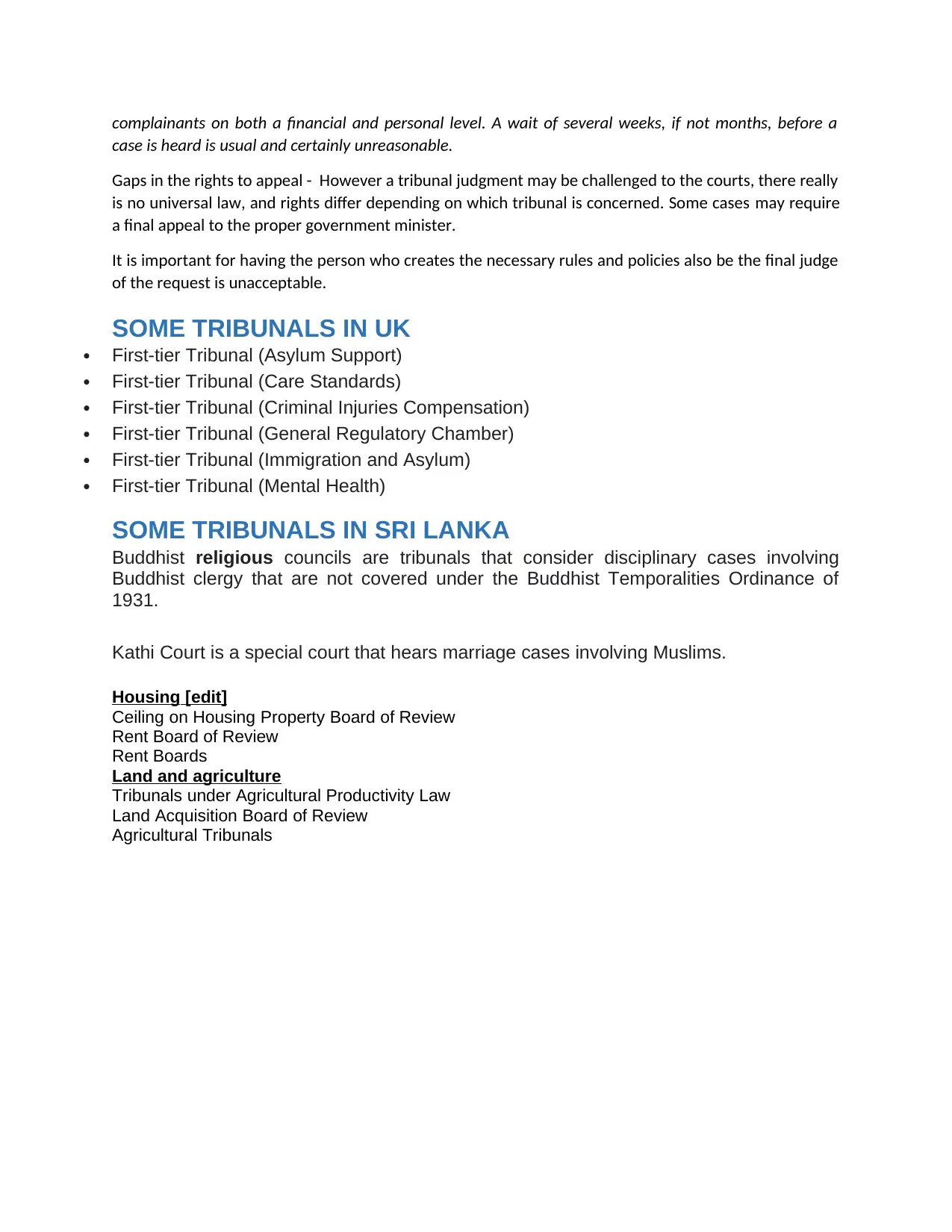
complainants on both a financial and personal level. A wait of several weeks, if not months, before a
case is heard is usual and certainly unreasonable.
Gaps in the rights to appeal - However a tribunal judgment may be challenged to the courts, there really
is no universal law, and rights differ depending on which tribunal is concerned. Some cases may require
a final appeal to the proper government minister.
It is important for having the person who creates the necessary rules and policies also be the final judge
of the request is unacceptable.
SOME TRIBUNALS IN UK
First-tier Tribunal (Asylum Support)
First-tier Tribunal (Care Standards)
First-tier Tribunal (Criminal Injuries Compensation)
First-tier Tribunal (General Regulatory Chamber)
First-tier Tribunal (Immigration and Asylum)
First-tier Tribunal (Mental Health)
SOME TRIBUNALS IN SRI LANKA
Buddhist religious councils are tribunals that consider disciplinary cases involving
Buddhist clergy that are not covered under the Buddhist Temporalities Ordinance of
1931.
Kathi Court is a special court that hears marriage cases involving Muslims.
Housing [edit]
Ceiling on Housing Property Board of Review
Rent Board of Review
Rent Boards
Land and agriculture
Tribunals under Agricultural Productivity Law
Land Acquisition Board of Review
Agricultural Tribunals
case is heard is usual and certainly unreasonable.
Gaps in the rights to appeal - However a tribunal judgment may be challenged to the courts, there really
is no universal law, and rights differ depending on which tribunal is concerned. Some cases may require
a final appeal to the proper government minister.
It is important for having the person who creates the necessary rules and policies also be the final judge
of the request is unacceptable.
SOME TRIBUNALS IN UK
First-tier Tribunal (Asylum Support)
First-tier Tribunal (Care Standards)
First-tier Tribunal (Criminal Injuries Compensation)
First-tier Tribunal (General Regulatory Chamber)
First-tier Tribunal (Immigration and Asylum)
First-tier Tribunal (Mental Health)
SOME TRIBUNALS IN SRI LANKA
Buddhist religious councils are tribunals that consider disciplinary cases involving
Buddhist clergy that are not covered under the Buddhist Temporalities Ordinance of
1931.
Kathi Court is a special court that hears marriage cases involving Muslims.
Housing [edit]
Ceiling on Housing Property Board of Review
Rent Board of Review
Rent Boards
Land and agriculture
Tribunals under Agricultural Productivity Law
Land Acquisition Board of Review
Agricultural Tribunals
⊘ This is a preview!⊘
Do you want full access?
Subscribe today to unlock all pages.

Trusted by 1+ million students worldwide

1 out of 7
Related Documents
Your All-in-One AI-Powered Toolkit for Academic Success.
+13062052269
info@desklib.com
Available 24*7 on WhatsApp / Email
![[object Object]](/_next/static/media/star-bottom.7253800d.svg)
Unlock your academic potential
Copyright © 2020–2026 A2Z Services. All Rights Reserved. Developed and managed by ZUCOL.





